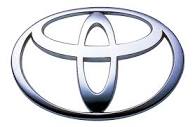Camry V6-3.5L (2GR-FE) (2008)
/Page-479001.png)
Compression Check: Testing and Inspection
INSPECT COMPRESSION
(a) Warm up and stop the engine.
(b) Disconnect the injector connectors.
(c) Remove the intake air surge tank (See: Powertrain Management/Fuel Delivery and Air Induction/Fuel Injector/Service and Repair/Removal).
(d) Remove the 6 ignition coils.
(e) Remove the 6 spark plugs.
(f) Check the cylinder compression pressure.
(1) Insert a compression gauge into the spark plug hole.
(2) While cranking the engine, measure the compression pressure.
Compression pressure:
1.4 MPa (14 kgf/cm2, 199 psi)
Minimum pressure:
0.98 MPa (10 kgf/cm2, 142 psi)
Difference between each cylinder:
0.1 MPa (1.0 kgf/cm2, 15 psi)
NOTICE:
-
Always use a fully charged battery to obtain an engine speed of 250 rpm or more.
-
Check the other cylinders' compression pressure in the same way.
-
This measurement must be done as quickly as possible.
(3) If the cylinder compression is low, pour a small amount of engine oil into the cylinder through the spark plug hole and inspect again.
HINT:
-
If adding oil increases the compression, the piston rings and/or cylinder bore may be worn or damaged.
-
If pressure stays low, a valve may be stuck or seated improperly, or there may be leakage in the gasket.
(g) Install the 6 spark plugs.
Torque: 18 Nm (184 kgf-cm, 13 ft-lbf)
(h) Install the 6 ignition coils.
Torque: 10 Nm (102 kgf-cm, 7 ft-lbf)
(i) Install the intake air surge tank. (See: Powertrain Management/Fuel Delivery and Air Induction/Fuel Injector/Service and Repair/Installation).
